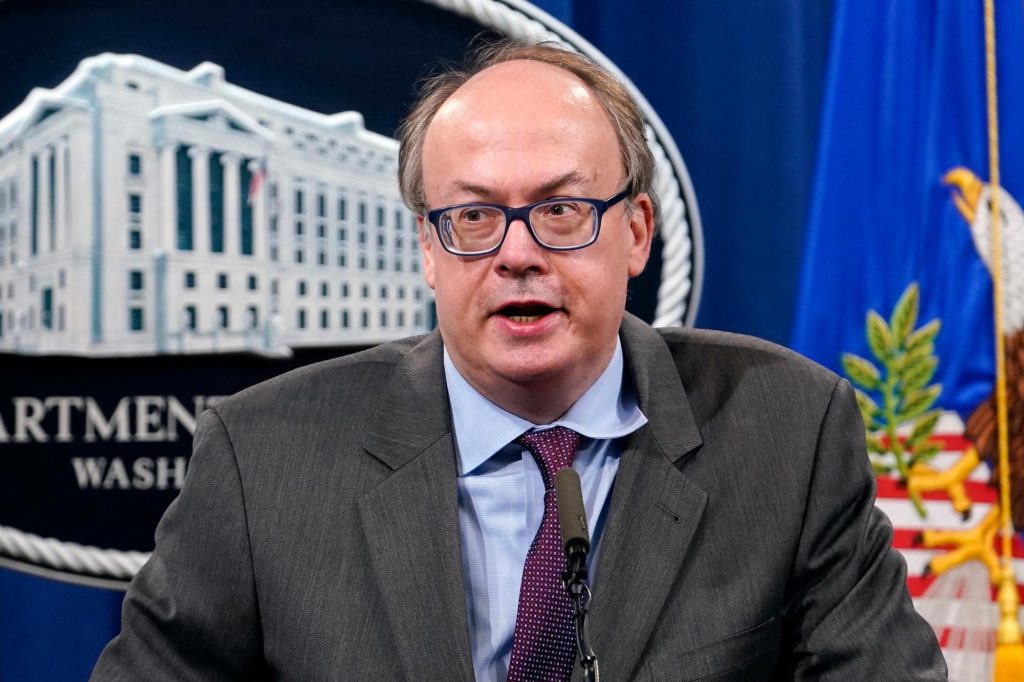By GARY FIELDS (Associated Press)
In the second day of the hearing to punish former Justice Department official Jeffrey Clark, it was revealed that he remained unshakable in his belief that there were irregularities and fraud in the 2020 election, despite his superiors' attempts to convince him otherwise.
During his testimony before the three-member Board of Responsibility, Jeffry Rosen, the acting Attorney General at the time, stated that he and Richard Donoghue, the acting No. 2, had multiple meetings with Clark after the 2020 presidential election to try to change his position on how the department should address allegations of voter fraud.
Clark is accused of trying to engage in dishonest behavior following Trump’s 2020 presidential election loss. The focus is on a letter he wrote after the election, expressing concerns about irregularities and pushing for an investigation. He tried to persuade Rosen and Donoghue to send the letter to Georgia.
At a meeting with Clark, Rosen and Donoghue questioned why he was pursuing an issue that was beyond his responsibilities as the acting head of the department’s civil division.
“Mr. Clark was not very open. He just said these were his ideas. He thought they were good,” Rosen said.
The two tried to explain to Clark why the department had concluded that although there was fraud and misconduct in the election, it was not enough to have affected the election results. Additionally, they discovered Clark had spoken with Trump, which violated department policy about contact with the White House.
Rosen said the meeting ended with Clark saying, “Well, I thought these were good ideas, but if you don’t like them, then okay.” Rosen and Donoghue thought Clark had accepted their explanation and that the matter was closed.
However, that was not the case. Clark persisted in his efforts and kept in touch with Trump.
Rosen changed his approach, and at one point Clark was given a classified briefing by the Office of the Director of National Intelligence regarding an issue he was concerned about.
But Clark continued his efforts and his communication with Trump.
Clark had requested an intelligence briefing from the Office of the Director of National Intelligence regarding an allegation he had heard. Rosen and Donoghue decided to give him access to the briefing and also suggested he speak with the U.S. Attorney in Georgia about how he had pursued the allegations there.
“He had shown interest in the ODNI report, so I thought that was a way to both prevent him from giving poor advice to the president and perhaps to understand the department's position,” Rosen testified.
Clark did not change his mind, disagreeing with the report, and did not contact the U.S. Attorney.
The situation became critical when Trump considered firing Rosen and appointing Clark in his place. This was avoided when senior leaders at the Justice Department and White House lawyers stated they would resign if Trump took that action.
Rosen’s testimony took up most of the day, although Clark was asked to testify by Hamilton Fox III, the disciplinary counsel at the hearing, despite objections from Clark’s attorneys, who indicated their client had clearly stated he would invoke privilege.
Clark responded to the first question about when he joined the Washington, D.C., bar and about his work history up until his time at the Justice Department.
He cited several privileges, such as executive privilege, law-enforcement privilege, deliberative-process privilege, attorney-client privilege and the Fifth Amendment, which protects people from giving self-incriminating testimony, during more than 30 minutes of questioning from Fox, with a focus on the letter and Clark’s role after the election.
After Fox’s questioning, board member Patricia Mathews asked who Clark’s client was for his use of attorney-client privilege, and Clark said, “President Trump. The head of the executive branch. The sole and the unitary head of Article Two, the executive branch of the United States government.”
One of his lawyers intervened and requested that Clark continue to use the privileges he invoked during the rest of the questioning.
Clark is facing criminal charges in Georgia for his involvement in the attempt to overturn the election there. Trump is one of the co-defendants.
Clark could be sanctioned, possibly disbarred. He has the option to appeal any action taken against him to the D.C. Court of Appeals.
Clark’s attorney, Harry MacDougald, has stated that the action being taken against his client for engaging in the normal back and forth between lawyers would have a chilling effect on the profession.
The case resumes Thursday with defense witnesses.









